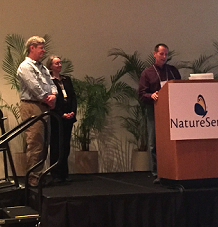 The Virginia Natural Heritage Program, the Minnesota Natural Heritage Information System, Corporación Autónoma Regional del Valle del Cauca (CVC) y Fundación Panthera Colombia earned NatureServe Network Program Awards at this year’s BWB Conference in Puerto Rico. The Network Awards recognize outstanding recent achievements and commitment to science-based conservation through collaboration, personal and scientific integrity, and the creation of high-quality data, tools and knowledge.
The Virginia Natural Heritage Program, the Minnesota Natural Heritage Information System, Corporación Autónoma Regional del Valle del Cauca (CVC) y Fundación Panthera Colombia earned NatureServe Network Program Awards at this year’s BWB Conference in Puerto Rico. The Network Awards recognize outstanding recent achievements and commitment to science-based conservation through collaboration, personal and scientific integrity, and the creation of high-quality data, tools and knowledge.
Conservation Impact Award:
Just a few of the Virginia Program’s highlights include the discovery of 36 new species new to science and 313 not previously found in Virginia. In addition, over 100 globally rare species were documented in 4,000+ caves across the biologically diverse state. The Network Program staff have worked diligently to protect over 760 occurrences of 458 rare plants, animals and natural communities. The Virginia Natural Heritage Program is celebrating its 30th anniversary.
Collaboration & Mentoring Award:
Karen Cieminski of the Minnesota Natural Heritage Information System was honored for her outstanding leadership and dedication to the overall improvement of the Network by leading the program’s Backlog Working Group. According to a statement by her co-nominators in recommending her for this award, “[Karen] has demonstrated a remarkable talent for leadership in her role of leading the Backlog Working Group, and through this, a deep and unwavering dedication to the improvement of our Network. She has a remarkable ability to objectively look ahead for the betterment of the Minnesota Program.”
Scientific & Technological Achievement Award:
Corporación Autónoma Regional del Valle del Cauca (CVC) y Fundación Panthera Colombia have created scientific and social impact by raising awareness on several feline species in protected areas through their extensive use of camera traps. A camera trap is a remotely activated camera that is equipped with a motion or infrared sensor. Camera trapping is a method for capturing wild animals—in this case, jaguars—on film when researchers are not present.
Network Alumni Award:
Since joining the Conservancy in January 2011, Dr. Jorge Brenner of The Nature Conservancy has led the organization’s conservation and sustainability efforts in Texas, and he is also one of 15 people who are part of the National Academy of Science Committee Gulf Oil Spill Study, which was created to study the effects of the Deepwater Horizon oil spill on ecosystem services in the Gulf.
Lifetime Achievement Award:
Tom Smith, recipient of NatureServe’s first-ever Lifetime Achievement Award, served as director of the Virginia Natural Heritage Program from 1992 until 2016. Smith joined the Virginia program in 1990 and through his dedicated leadership thousands of new discoveries have been made, the preserve system has grown from four to 63 properties and the program was three times recognized as an internationally award-winning program. He recently was promoted to deputy director of operations for the Virginia Department of Conservation and Recreation.